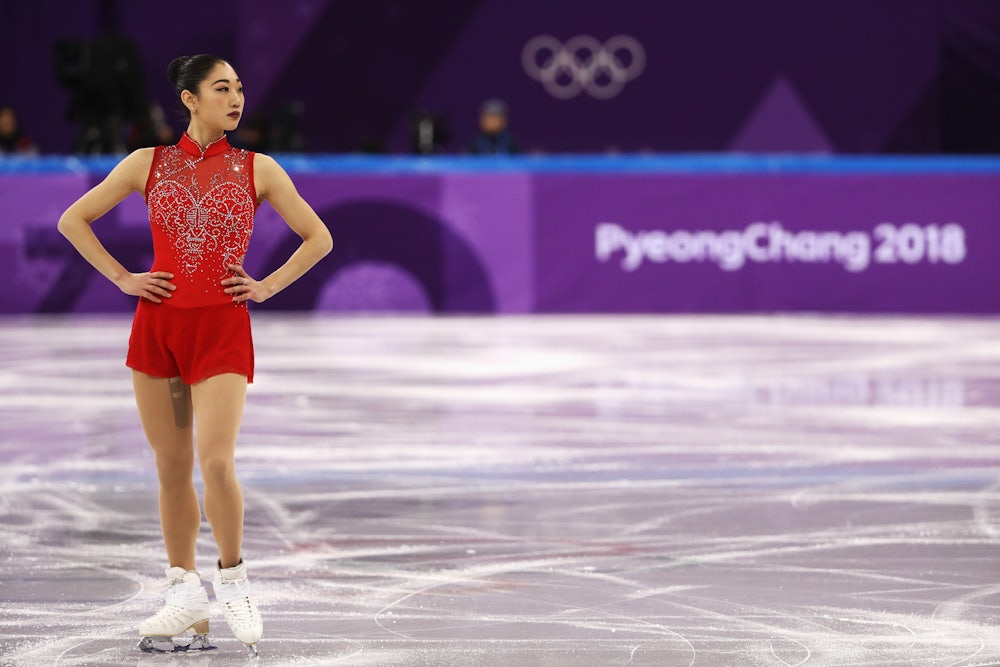U.S. Olympic figure skater Mirai Nagasu landed the notoriously challenging triple axel on Monday night, making national and athletic history. She also made it into New York Times writer Bari Weiss’s Twitter feed. Retweeting a video of Nagasu’s jump, Weiss wrote in a now-deleted tweet: “Immigrants: They get the job done.”
Twitter users and follow-up articles quickly pointed out that Nagasu isn’t an immigrant. She was born and raised in California. Supermodel Chrissy Teigan noted that Weiss’s atrocious tweet is part of a long tradition of racism against Asian Americans by othering them as perpetual foreigners. In an equally atrocious response, Weiss chalked her mistake up to “poetic license,” claiming her tweet was a reference to the play Hamilton and said the backlash was “another sign of civilization’s end.”
But Weiss’s tweet is not just a racist mischaracterization of Nagasu. It’s also a reflection of the “good immigrant” narrative, which celebrates immigrant labor, rather than immigrants, and further implies that not all immigrants—and thus not all Americans or people—are equal. Weiss finds herself among other well-intentioned pro-immigration voices on this front, including Illinois Senator Dick Durbin, who, in a Senate floor speech Tuesday morning, similarly expounded on the “good immigrant” narrative. In this case, Durbin co-opted the achievements of another Asian American athlete at the games, snowboarder Chloe Kim, who like Nagasu was born and raised in California: “Kim’s story is the story of immigration in America,” Durbin said. He also declared that Kim’s father, Jong Jin Kim, who is an immigrant, was “[a] man who might not have passed some of the merit-based tests that we’re hearing around here,” referencing the Trump administration’s restrictionist stance on immigration. Esther Yu Hsi Lee of ThinkProgress made a similar argument—writing that each athletic achievement “pokes holes into the Trump administration’s criticism that only worthy-enough immigrants and their progeny should be welcomed into the United States.”
Durbin and Lee, who is a Dreamer herself, rightly celebrate the legacies of immigrants and people of color. They also rightly recognize the sacrifices made as part of the complicated decisions inherent to migration and resettlement. But even as they renounce the Trump administration’s merit-based immigration talk, Lee and Durbin espouse the foundational mythology of U.S. meritocracy: that, with hard work and perseverance in service of self and country, one can earn and deserve a place in the United States. But these athletes’ Olympic medals do not retroactively justify their parents’ immigration. A spot on the national team will not ameliorate the fact that immigrants’ contributions to America’s political, economic, and cultural legacies came at great cost: For generations, the U.S. government and corporate America exploited the lives and labor of black and brown people abroad and at home. The United States owes it to immigrants and people of color to commit to humane immigration policies, with or without hypothetical Olympians and would-be inspirational figures.
Worse, unintentionally perpetuating the “good immigrant” versus “bad immigrant” dichotomy—which long precedes the Trump administration—feeds into the very movement people like Durbin and Lee are criticizing. To return to Weiss’s tweets, her bemoaning of “civilization’s end” echos rhetoric used by the right and alt-right, which have similarly heroized Asian Americans. The right and alt-right use Asians—in particular, East Asian Americans—to aid in their own immigration argument: that some people are just plain better than others. These odious commentators claim that while most black and brown immigrants—and citizens—are eroding Western civilization, Asian immigrants are exceptional; they are the model minority. “The insidious construction of Asian Americans as a ‘good’ minority,” J.C. Pan wrote in Jacobin, is “a designation that has been used as a means to justify and perpetuate racism against blacks in particular.” This sentiment has been echoed by Trump himself, who, in the same meeting as his infamous “shithole countries” remark, said “that immigrants from Asia should be favoured over those from Haiti and Africa,” according to Al Jazeera.
Of course, treating Asians as exceptional in right and far-right narratives does not inoculate them from racism—though all too often, it does obfuscate the role of racism and economic exploitation in the Asian American immigrant experience. Incredible stories of success still occur within the context of racism at home. Within the Olympic circuit, Nagasu experienced this firsthand when she was denied a spot on the 2014 Olympic team. Nagasu’s bronze medal at that year’s U.S. Figure Skating National Championships would normally guarantee a spot on the team. But in an unprecedented move, judges instead chose blonde-haired, blue-eyed Ashley Wagner to represent Team USA, leading to speculation of racism. Kim’s success, too, has led to disturbing instances of American exceptionalism and fetishization, while the disproportionate media interest in her family—compared with other high-profile snowboarders, like Shaun White—has invited speculation of soft-power diplomacy.
Worse, pedestaling successful Asian immigrant families also often silences and subjugates undocumented Asian immigrants, who represent one out of every seven Asian immigrants living in the United States. The voices of those Asians at risk of deportation can be overlooked, in no small part because they don’t fit into the model-minority myth.
None of this means we should not celebrate the accomplishments of the Asian American Olympians. There is a record 13 Asian American athletes on this year’s relatively diverse but still majority-white U.S. Olympic team. Despite the dominating number of white athletes on Team USA overall, Asian Americans make up seven out of the 14 figure skaters—another record. Undoubtedly, Nagasu and Kim and the eleven other Asian Americans on the team have added to the U.S. Olympic canon. But they are not other, and they are not better immigrants. To the extent that they are exceptional, they are exceptional athletes. But we should celebrate their achievements as Americans this winter without co-opting their stories into reductive narratives.
